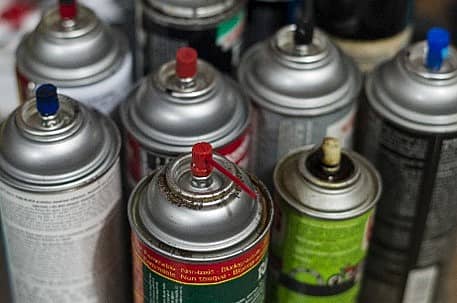In January 2023, the Massachusetts Department of Environmental Protection (DEP) proposed to adopt several new or revised requirements to its hazardous waste regulations, including adding hazardous aerosol cans to the list of universal waste. The final rule is anticipated to go into effect in the Fall, 2023.
The changes are expected to ease regulatory burdens on businesses that discard aerosol cans, promote the recycling of aerosol cans, and to reduce the quantity of these wastes going to hazardous waste landfills.
Universal waste currently includes:
- Hazardous batteries (e.g., nickel cadmium, button batteries)
- Mercury-containing devices such as thermostats, thermometers, and gauges
- Mercury-containing lamps such as fluorescent lamps and bulbs
- Hazardous pesticides
Under the proposed rules, an aerosol can is considered a non-refillable receptacle containing a gas compressed, liquefied, or dissolved under pressure, the sole purpose of which is to expel a liquid, paste, or powder and that is fitted with a self-closing release device allowing the contents to be ejected by the gas.
Aerosol cans that are not covered under the proposed rule include aerosol cans that are not yet waste. A used aerosol can becomes a waste on the date it is discarded and an unused aerosol can becomes a waste on the date the handler decides to discard it.
In addition, the rule doesn’t cover aerosol cans that are not hazardous waste. An aerosol can is a hazardous waste if the aerosol can exhibits one or more of the characteristics identified in 310 CMR 30.120 (i.e., ignitability, corrosivity, reactivity, or toxicity), or if it contains a substance that is listed hazardous waste per 310 CMR 30.130. The lists include acutely hazardous waste (P List), acutely toxic waste (U list), non-specific industrial process waste (F list), and specific industrial process waste (K list).
Lastly, aerosol cans that meet the standard for empty containers under 310 CMR 30.106(2) are not considered universal waste.
Aerosol cans that are considered universal waste must be managed in much the same way as other types of universal waste. Specifically, aerosol cans must be managed in a way that prevents releases of any universal waste or component of a universal waste to the environment. Universal waste aerosol cans must be accumulated in a container that is structurally sound, compatible with the contents of the aerosol cans, lacks evidence of leakage, spillage, or damage that could cause leakage under reasonably foreseeable conditions, and is protected from sources of heat.
Universal waste aerosol cans that show evidence of leakage must be packaged in a separate closed container or overpacked with absorbents, or immediately punctured and drained according to specific requirements outlined in the proposed rules.
Universal waste aerosol cans (i.e., each aerosol can), or a container in which the aerosol cans are contained, must be labeled or marked clearly with any of the following: Universal Waste Aerosol Can(s), Waste Aerosol Can(s), or Used Aerosol Can(s).
Containers, or individual cans not in containers, must also be labeled with the date that accumulation began, and must be disposed of within one year from the date the waste was generated.
More details on the proposed requirements for managing aerosol cans can be found in the Proposed Amendments to 310 CMR 30.000, Hazardous Waste. For more information on universal waste, please check out our blog Are you Properly Managing Your Universal Waste, or email us at [email protected].
This blog was written by Beth Graham, Director of Quality, Research, and Training


